Drinking Water During the War: How International Partners Are Helping Restore Water Supply in Ukrainian Communities
As of 2025, the war has had a profound impact on water supply and sanitation systems across Ukrainian communities. According to the Ministry of Economy, Environment and Agriculture of Ukraine, around 8.5 million Ukrainians currently face limited access to safe drinking water.
Given the ongoing war and the shortage of funds, Ukrainian communities are struggling to restore and modernise their infrastructure on their own. Therefore, international support in this area remains critically important.
Non-governmental organisations such as the Ukrainian NGO DESPRO and Helvetas Swiss Intercooperation are actively implementing various approaches to community recovery and sharing this knowledge with local authorities — particularly in the context of rebuilding water supply and sewage systems, which are largely worn out and in urgent need of renewal. Even before the war, many networks were outdated — some pipes and pumping equipment have been in use for over 30–40 years. The full-scale invasion has only worsened the situation: pumping stations, water pipelines, and sewage networks have been damaged or destroyed due to shelling and hostilities. This has led to frequent breakdowns, water supply interruptions, and difficulties in maintaining stable services in communities.
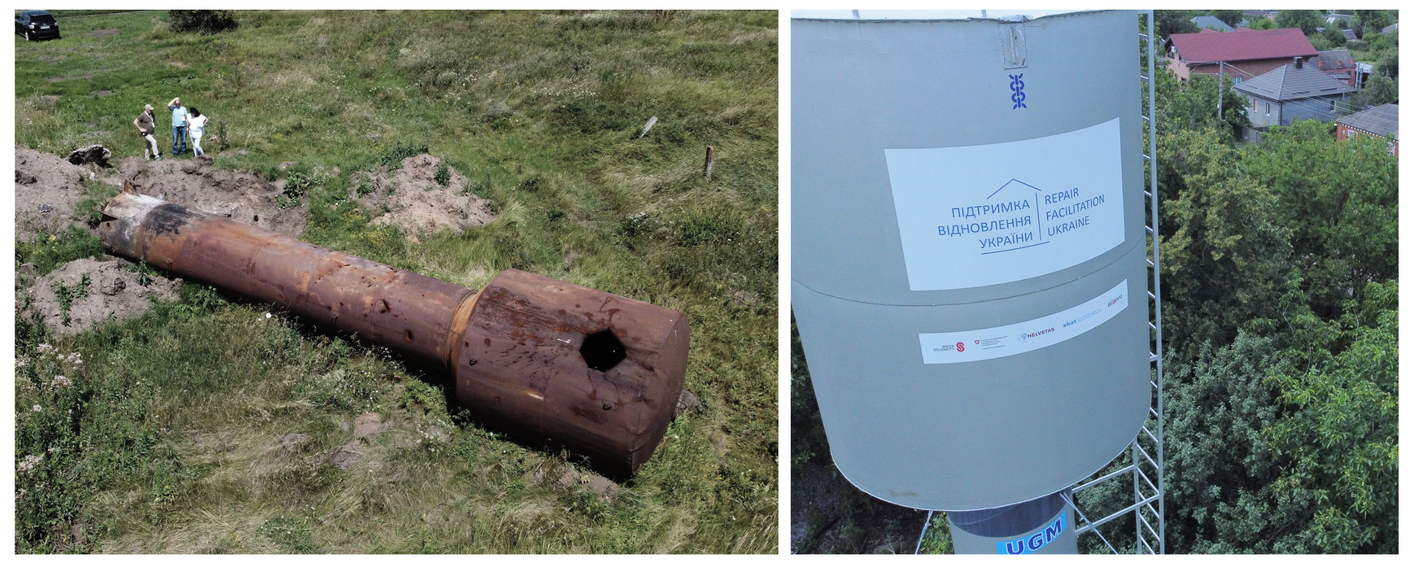
Ukrainian NGO DESPRO and Helvetas Swiss Intercooperation have been cooperating on restoring water supply systems in communities since the early days of the full-scale invasion.
The strategic involvement of international partners primarily includes restoring and modernising infrastructure, as well as strengthening the capacity of local utilities to provide reliable and sustainable services — both now and in the future.
“Access to water and sanitation is a basic human need, especially during wartime. It directly affects the lives, health, and safety of people. That’s why restoring water and sanitation systems and ensuring proper hygiene conditions is a key focus for international organisations such as Helvetas and Swiss Solidarity, as well as for national ones like DESPRO,”
says Vyacheslav Sorokovskyi, project team leader at DESPRO.
“In general, Ukraine’s water supply infrastructure is extremely worn out — estimates range from 35% to 70%. The war has only aggravated these problems: hundreds of facilities have been destroyed, including water towers and pumping stations. Therefore, recovery efforts often go hand-in-hand with modernisation to eliminate weak points in existing systems.”
International and Ukrainian organisations working on restoring water supply exchange experience, coordinate approaches, and maintain a unified project database within the WASH Cluster Ukraine. Helvetas and Swiss Solidarity play an important role in this work. Since 2022, they have supported numerous water-related projects — from ensuring access to safe water in affected communities to providing sanitation facilities in collective centres for internally displaced people (IDPs).
With financial support from Swiss Solidarity, Helvetas and DESPRO have implemented around 50 projects, improving living conditions for 190,000 Ukrainians.
For Helvetas, recovery is not just about repairing damage — it’s about creating sustainable systems that communities can manage independently. Since 2022, the organisation has evolved from emergency humanitarian response to systematic recovery, supporting local authorities in planning, implementing, and scaling practical solutions.
“Our goal is not merely to rebuild, but to help communities take ownership of the process. Each project combines technical quality with transparency, community participation, and training of local teams — that’s what makes recovery sustainable,”
notes Anastasiia Kostiuchenko, Programme Manager for Helvetas in Ukraine.
“To this end, Helvetas, together with sectoral experts, developed Methodological Guidelines for Needs Assessment in Recovery. This methodology serves as a roadmap for understanding damage, resource requirements, and priorities for communities that were occupied, saw active fighting, or suffered from shelling.”
“We work with communities in Kharkiv and Kyiv regions located in relatively safe areas. Our main task is to strengthen the capacity of municipal utilities in water supply and sanitation. This includes restoring and modernising infrastructure, supporting staff, and training them to operate new equipment. In this way, we combine humanitarian aid with elements of long-term development, implementing the Build Back Better principle,” adds Vyacheslav Sorokovskyi.
One example of this approach is the “Sylna Hromada” project, implemented by Helvetas in partnership with DESPRO and funded by Swiss Solidarity. In 2025–2026, the initiative will modernise 11 water supply and sanitation systems in communities of the Kyiv and Kharkiv regions, providing access to water for over 86,000 residents. Importantly, the project not only restores infrastructure but also strengthens local governance capacity to ensure systems remain functional in the long run.
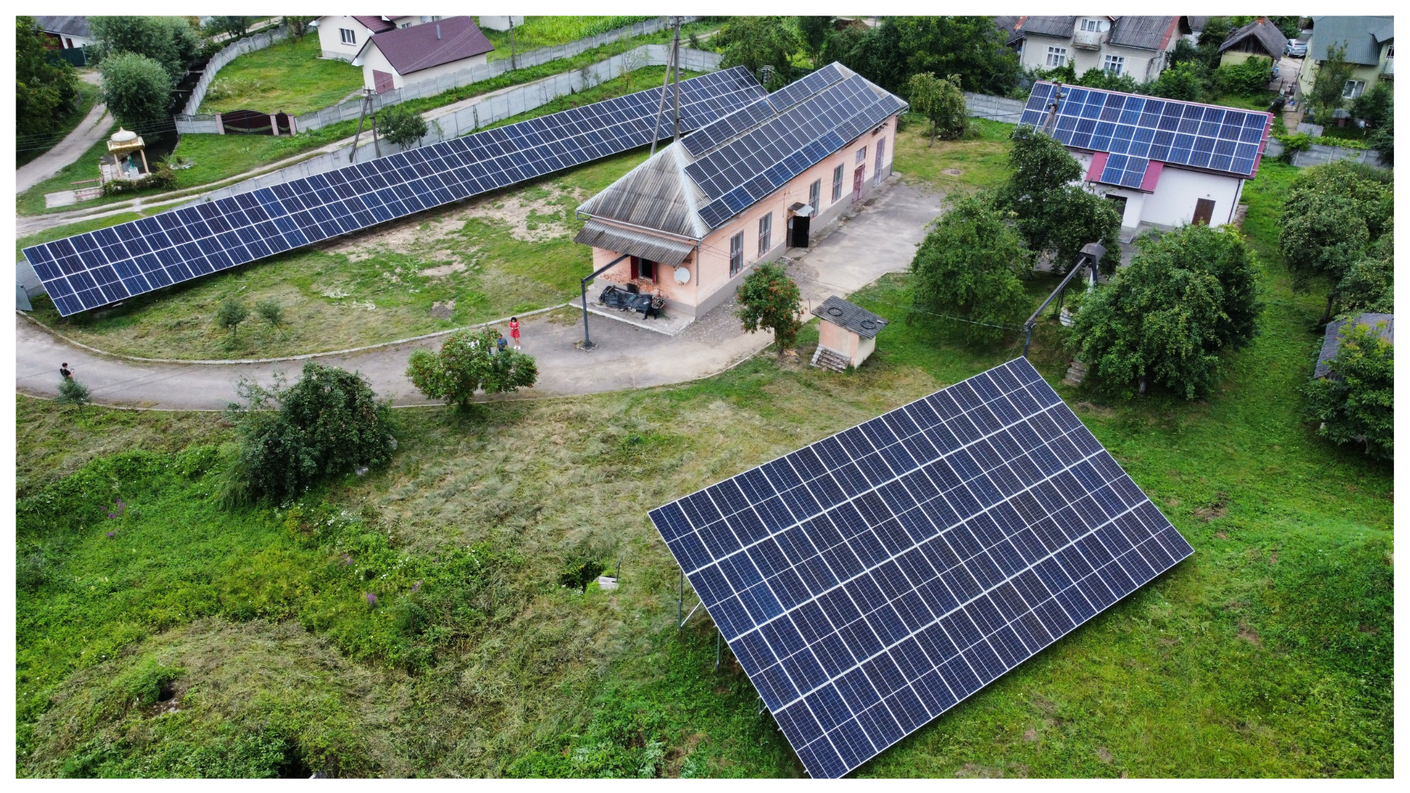
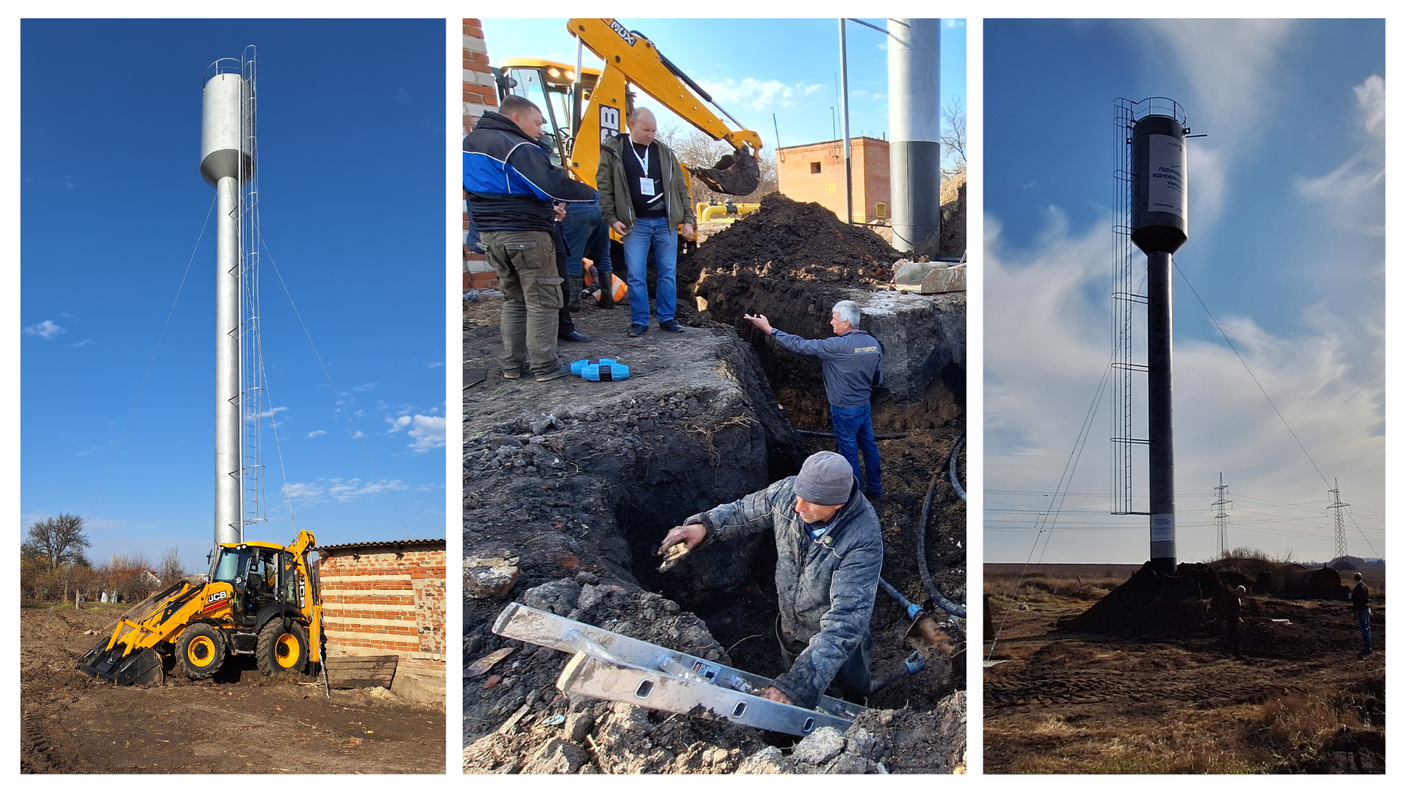
Water supply infrastructure restored using modern technical solutions in communities across Kharkiv, Kyiv, and Ivano-Frankivsk regions.
Key partners for DESPRO and Helvetas include local self-government bodies and municipal enterprises, as they are responsible for water supply and sanitation facilities under communal ownership. Proper legal and organisational arrangements — including land use and asset transfer — are essential for sustainable recovery. Direct cooperation with communities ensures accurate needs assessment, investment planning, and even resource mobilisation by utilities themselves, whether technical or human.
Helvetas also enhances the local component by strengthening the capacity of civil society organisations — providing 20 grants to implement recovery initiatives. These efforts have helped restore not only private homes but also critical social facilities such as hospitals, schools, and care centres. Restoring access to water, infrastructure, and housing brings life back to war-affected communities — preserving human capital and reinstating access to education and work.
Local organisations simultaneously receive training in project management, finance, and reporting — ensuring a localisation approach, where decisions are made and retained at the community level even after the projects end.
A Focus on Sustainable Solutions
Given ongoing shelling and attacks by Russia, ensuring energy independence of local infrastructure is a major challenge.
“When planning power supply systems, we avoid simply providing generators and instead implement solar hybrid stations for pumping equipment. This reduces electricity consumption from the grid and allows systems to operate for 3–4 hours during blackouts — the typical outage duration. In the early stages, we did supply generators to ensure backup power, but in regions where DESPRO operates, power supply has now stabilised, allowing us to focus on sustainable solutions and local capacity development,” explains Vyacheslav Sorokovskyi.
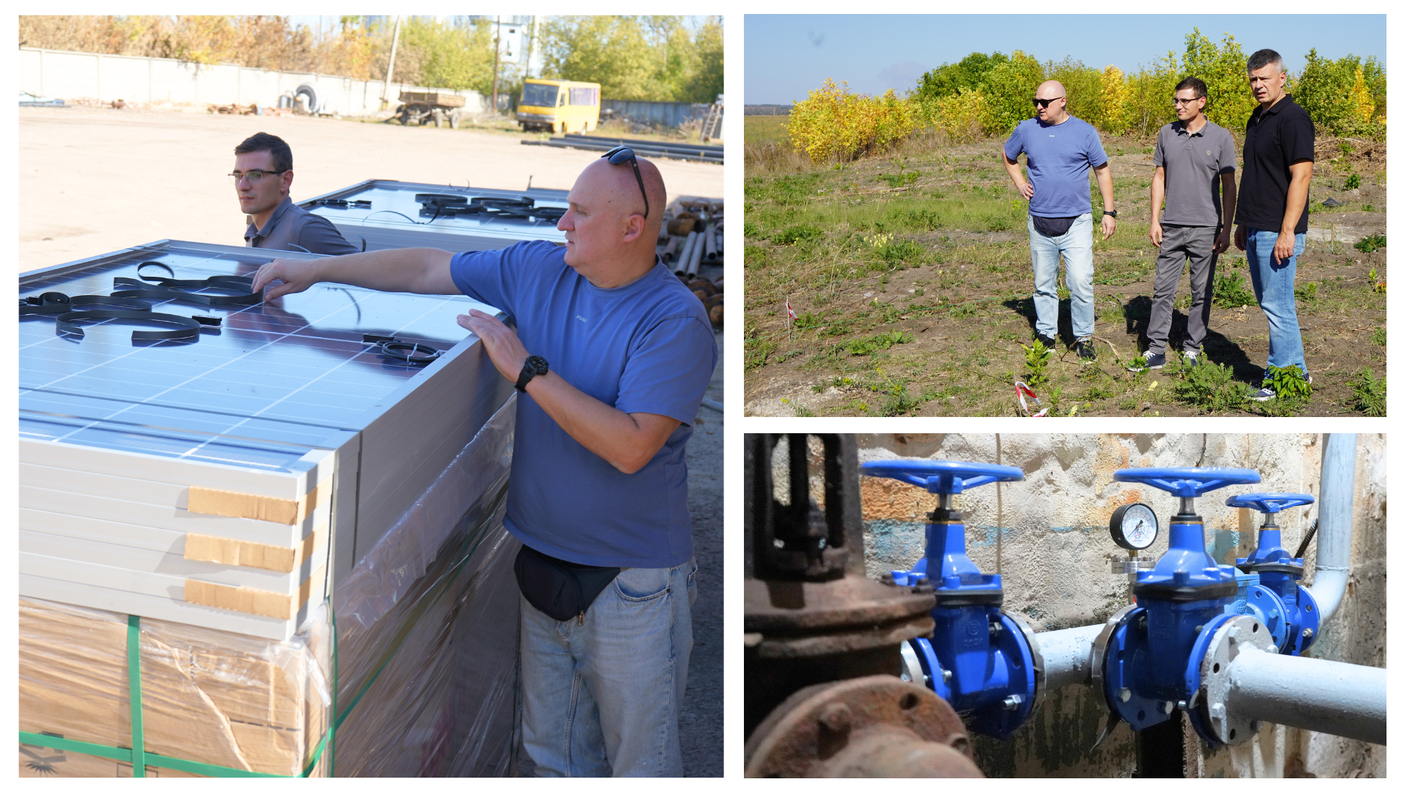
Thanks to cooperation between Helvetas and DESPRO, the Balakliia community (Kharkiv region) will receive a solar power station ensuring uninterrupted water supply for residents even during power outages.
DESPRO expert Andrii Kavun adds: “When we apply the ‘Build Back Better’ principle, it’s not just about repairs but about modernisation using modern technologies so that community infrastructure is resilient to future challenges.
Our approach includes several stages: data collection on network conditions, collaboration with communities and experts, analysis of options, and selection of optimal solutions. This allows us to act quickly while introducing sustainable practices that ensure system efficiency and longevity.
We place special emphasis on energy efficiency and independence. First, we minimise power consumption through equipment and process optimisation. Then we integrate renewable energy sources — primarily solar hybrid systems, which can cover up to 90–95% of energy needs in summer and ensure uninterrupted operation even during winter outages. Depending on conditions, they are complemented by water towers or generators.
Thanks to this comprehensive approach, we not only restore services but make them more reliable, cost-effective, and crisis-ready.”
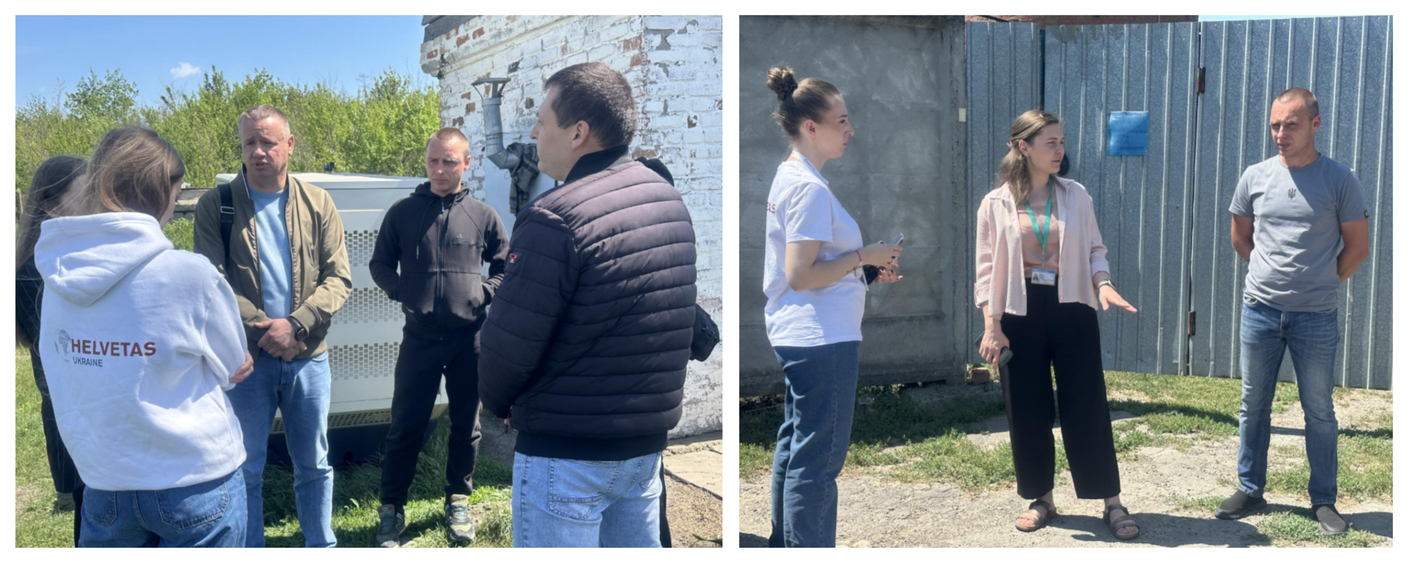
Sakhnovshchyna settlement (Kharkiv region). Due to worn-out networks and power supply interruptions, residents frequently faced water shortages. Thanks to Helvetas and the charity “Hearts of the Unbroken”, stable water supply has been restored for over 11,000 people, including 4,000 IDPs, ensuring uninterrupted operation of hospitals and social institutions.
Helvetas’ national infrastructure recovery portfolio now supports over 500,000 people across Ukraine. Achievements include repairs to more than 600 private homes and 43 apartment buildings, modernisation of 57 water supply systems, installation of 130 collective heating points, and deployment of two mobile “repair hubs”. These initiatives not only meet urgent needs but also demonstrate how sustainable solutions can be scaled up in the post-war context.
A vivid local example is the village of Hoholiv in the Velykodmytrivska community, Kyiv region, where a main borehole provides drinking water to around 500 residents and social facilities, including a kindergarten.
“We modernised the entire system in stages,” says Andrii Kavun. “The first stage involved equipping the borehole with a modern pump and a control cabinet with a frequency converter, significantly reducing energy consumption. The second stage was the construction of a hybrid solar power plant, ensuring uninterrupted water supply even during power cuts.
A 13.5 kW solar field, 17.3 kW battery, and 15 kW inverter were installed. This setup covers 90–95% of the borehole’s energy needs during spring–summer and up to 50% in winter. Even during prolonged outages, water supply remains stable due to stored battery and inverter reserves. As in our other projects, we rebuilt not ‘as it was’ but better — replacing the old water tower with a more efficient, energy-independent system. This ensures reliability, energy savings, and financial benefits for the utility. The project will pay for itself in about five years — something a traditional water tower could never achieve.”
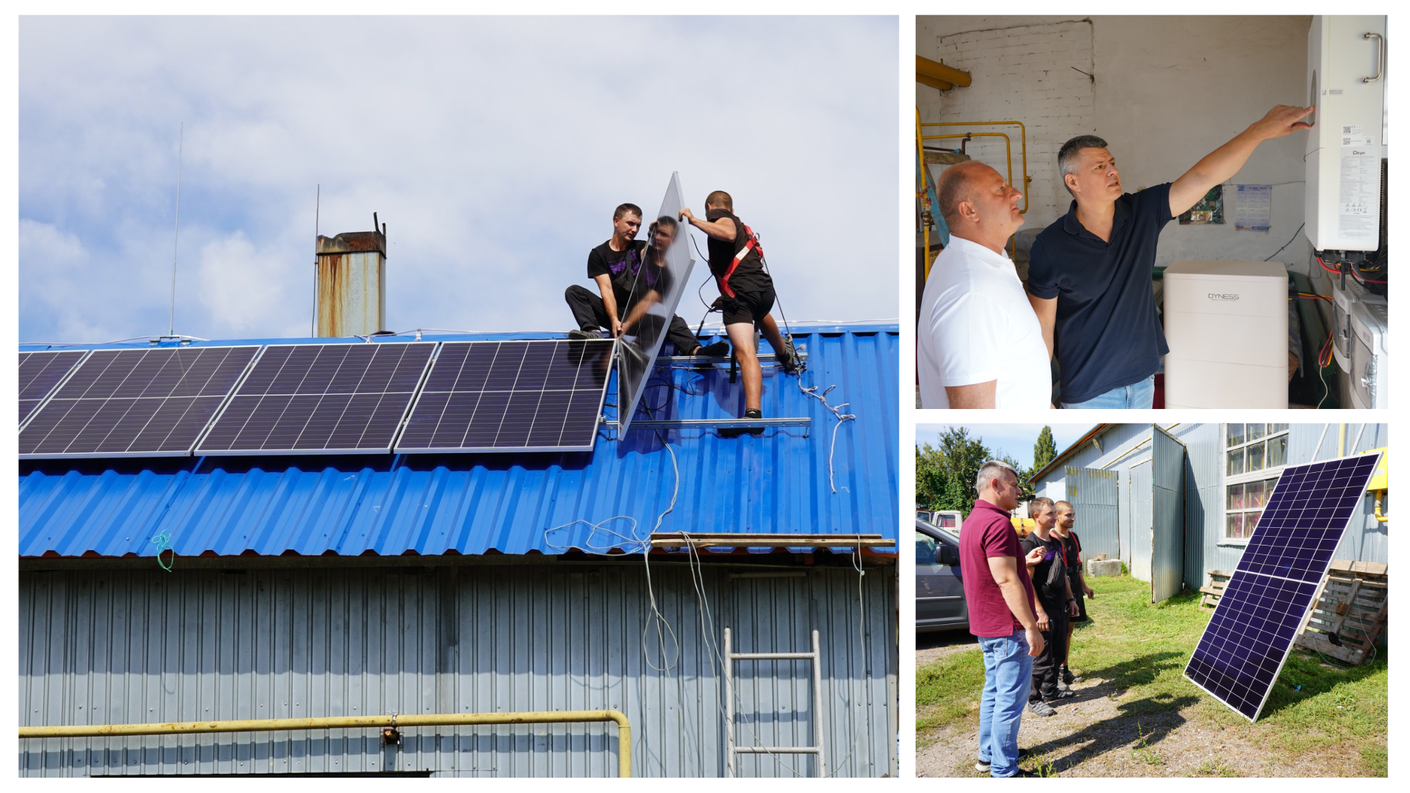
Velykodmytrivska community (Kyiv region) — the borehole has been equipped with a modern pump and control cabinet with a frequency converter, reducing energy consumption. A hybrid solar power plant now ensures uninterrupted water supply even during blackouts.
Andrii Dranyi, Head of the municipal enterprise Velykodmyrske, emphasises:
“This support is vital. After the destruction caused by the war, restoring communal facilities on our own would have been very difficult. Thanks to the “Sylna Hromada” project, we have modernised our networks, ensured continuous water supply for residents and emergency services, and reduced electricity costs through solar energy and modern equipment. Residents are satisfied, and as a utility, we have gained valuable experience in working with international organisations — something that will help us implement future projects with new partners.”
“For us, each facility is not just a restored system but a tested model ready for scaling. Helvetas works to make these practices part of national recovery policies,”
stresses Petr Base, Head of the Helvetas Swiss Intercooperation branch in Ukraine.
All project activities are accompanied by regular monitoring visits, enabling the team to track quality, resource efficiency, and alignment with community needs. Procurement processes are transparent and competitive, preventing misuse and strengthening trust among partners and beneficiaries.
Active communication with local authorities and residents — through regular updates, feedback collection, and open discussions — remains integral to the process.
“Transparency and accountability are not formalities — they are elements of a trust-based culture we help communities build,” adds Petr Base “That’s where genuine recovery begins.”
Through this collaborative approach, Helvetas and DESPRO combine innovation, quality control, financial transparency, and local engagement to deliver tangible results in rebuilding Ukraine and enhancing the capacity of communities to provide quality public services.
Helvetas’ activities in Ukraine extend beyond individual projects. The organisation continues to act as a systemic contributor to recovery, focusing on sustainable infrastructure models, localisation, and knowledge transfer. Together with the National Housing Institute, Helvetas has prepared Ukraine’s first comprehensive study on social housing reform — a pioneering step towards a fair, transparent, and EU-aligned housing system.
The study demonstrates how Ukraine can move from outdated “free housing” schemes to social rent, managed by professional operators and supported by digital transparency tools. It also contributes to the development of a National Housing Strategy and a new legislative framework.
The research has already been integrated into training programmes for local and national officials, ensuring practical application of its findings.
Helvetas will present the full report at the Rebuild Ukraine 2025 Conference (13–14 November, Warsaw), showcasing how evidence, partnerships, and local pilots are driving systemic change in the housing sector.
The “Sylna Hromada” project is implemented by Helvetas Swiss Intercooperation (Switzerland) and the NGO DESPRO (Ukraine) as part of Swiss support to Ukraine, funded by Swiss Solidarity.
01 November 2025
Децентралізація: найважливіше за жовтень
Децентралізація: найважливіше за жовтень
На початку кожного місяця портал «Децентралізація» підбиває підсумки рішень Уряду та Парламенту, що стосуються...
31 October 2025
Конкурсний відбір територіальних громад для...
Ми отримали понад 500 заявок від територіальних громад з усіх областей України. Ми провели два етапи...
31 October 2025
Мінрозвитку оприлюднило звіт за результатами...
Міністерство розвитку громад та територій України оприлюднило звіт за результатами публічних консультацій щодо...
31 October 2025
«Агломерація – це не політика, а спосіб зробити громади сильнішими»
«Агломерація – це не політика, а спосіб зробити...
Інтерв’ю з Романом Кізимою, виконавчим директором Асоціації органів місцевого самоврядування «Львівська...